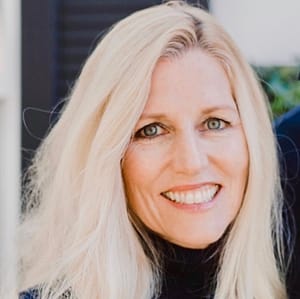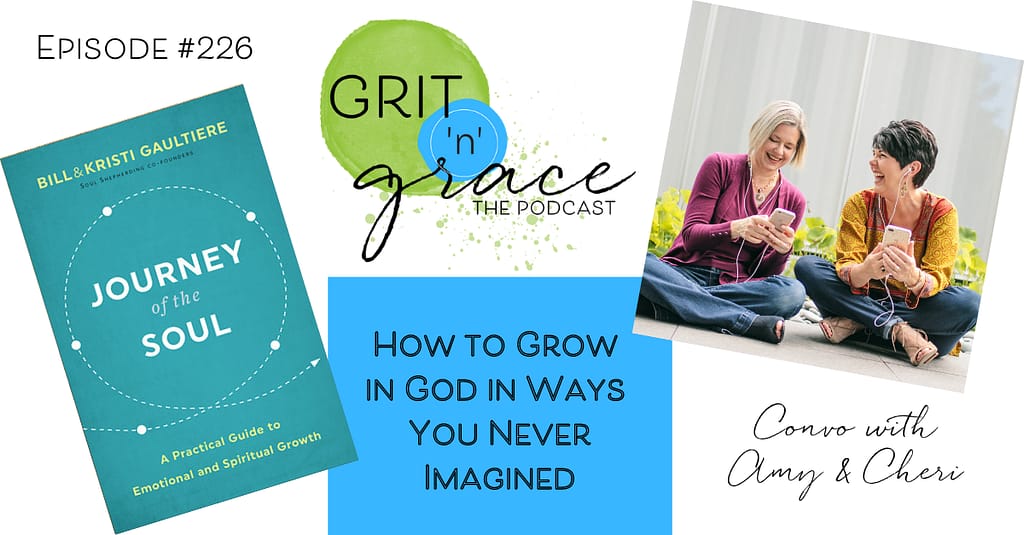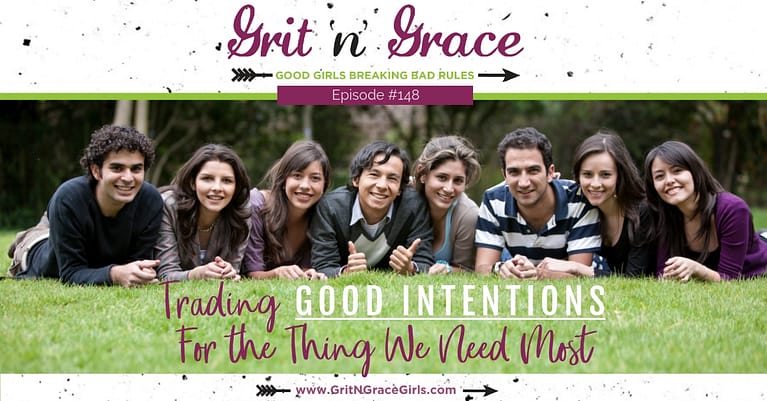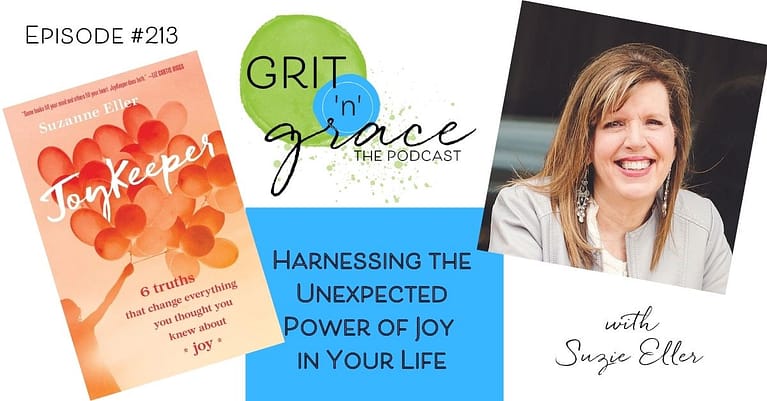Limited. That’s the way most of us would describe our understanding of the spiritual growth curve. Today, Cheri and Amy discuss what they’ve been learning about the stages of spiritual growth from Kristie Gaultiere, co-author of Journey of the Soul: A Practical Guide to Emotional and Spiritual Growth. God wants us to know Him in ways deeper than ever before! Listen in today to get a hope-filled view of our struggles and a glimpse of the spiritual riches beyond the walls we all hit.
(This page contains affiliate links. Your clicks and purchases help support Grit 'n' Grace at no extra charge to you.)
Recommended Resources
- Journey of the Soul website
- Soul Shepherding website
Downloads
Your Turn
- When you’ve hit a dry patch or struggled in your spiritual life, how did describe it? Did you see it negatively or positively?
- How does it help to know that The Wall is a normal part of spiritual growth?
- How does knowing that you can go deeper in God inspire you?
Featured Guest — Kristie Gaultiere

As therapists and spiritual directors they have spent over 70,000 hours in the pool of pain with people and share their learnings to strengthen others in their intimacy with Jesus and emotional, relational and spiritual health.
Kristi is also the mother of three adult children and she has two grandchildren.
Connect with Kristie at www.journeyofthesoul.org, www.soulshepherding.org, via Instagram, and on Facebook!
Transcript — scroll to read here (or download above)
****
Grit ‘n’ Grace — The Podcast
Episode #226: How to Grow in God in Ways You Never Imagined
Note: This is an unedited, machine-generated transcript that is 70-80% accurate.
Grit ‘n’ Grace — THE PODCAST
Episode #226: How to Grow in God in Ways You Never Imagined
Cheri Gregory 00:00
Okay, Amy, I’m going to ask you a question. And I’m not going to define any of the terms in the question. You just have to give me your gut answer. Okay? No, if I asked you, are you living in the cycle of works? Or the cycle of grace? How would you answer?
Amy Carroll 00:17
Well, Cheri, what makes you ask that question?
Cheri Gregory 00:21
It’s on topic for our conversation today. Are you dodging the question, Amy?
Amy Carroll 00:27
Well, if I’m honest, and I think you already know the answer to this cycle of works, and I really have to be intentional shifting to the cycle of grace.
Cheri Gregory 00:41
I might have suspected that answer just maybe.
Amy Carroll 00:45
Yeah, I’m gonna make sure I asked the first question next episode.
Cheri Gregory
Well, this is Cheri Gregory.
Amy Carroll
And I’m Amy Carroll,
Cheri Gregory 00:53
and you’re listening to Grit ‘n’ Grace—THE PODCAST that equips you to lose who you’re not love who you are, and live your one life?
Amy Carroll 01:02
Well, today, we’re processing what we learned from Kristi Gaultiere, co-author of Journey of the Soul: A Practical Guide to Emotional and Spiritual Growth.
All right, Cheri, it’s your turn to do a little personal disclosure. Tell us what you need to lose. What is your NOT this week?
Cheri Gregory 01:19
All right, well, let me first start by doing a quick recap of the C-H-R-I-S-T stages of faith. C-H-R-I-S-T is the acronym that they use. And I want to make sure that’s back in my mind, in your mind. And in our listening friends.
(Hello, everybody. Thank you for joining us today!)
Just want to get this back in all of our minds here. So the C stage is confidence in Christ, the H stage is helping discipleship are his responsibilities in ministry. And then in the circle, there’s a line, and it says T is through the wall or transition. So that’s not part of the acronym. It’s like a break in the cycle. And then the AI is inner journey. S is spirit, lead ministry. And T is transforming union. So with that in mind, my not statement is you’re not a failure for hitting the wall.
Amy Carroll 02:14
Oh, so good. That wall thing I think was my favorite, the wall thing, the wall stage concept. It was probably my biggest Aha,
Cheri Gregory 02:23
yeah. And you know, I even made a note to myself, I had other words I considered using instead of failure, you’re not a backslider. You’re not a disappointment. You’re not a bad Christian. You’re not a second class citizen. Like I have so many feelings around this. And Christy expressed it this way herself. When she was talking about understanding the wall, she said, I began to get this vision of Oh, there is more, this is where I am. It isn’t something where I’ve backslidden or nothing has been true that I’ve experienced so far. This is part of my journey. And she’s referring to hitting the wall. And so normalizing that was just so comforting. Honestly, it was so affirming. And you know, the more I’ve been thinking about it, since we had the interview, I’m pretty sure that I have basically flipped flopped between the R, which is responsibilities in ministry and hitting the wall for my entire life.
Amy Carroll 03:15
Okay, can we pause for a moment?
Cheri Gregory 03:17
Yes.
Amy Carroll 03:17
Can I interrupt you for a moment is because my friend Wendy that I’m doing this with on Thursday says something fascinating what she said that the our stage is what churches really prepare us to be like, that is the ultimate Oh, yeah. But it’s only halfway. Yeah. So yeah, I think that is actually reinforced by our churches, which is a stunning realization. Okay, keep going. Sorry.
Cheri Gregory 03:45
Yeah. No, no, please tell Wendy “Thank you” for me. It makes me feel better that I’m not the only one who kind of felt this way. Like, because I was raised in a Christian home where we were at church show on a regular basis. And from a very early age, I was involved in ministry, like when I was in eighth grade, I was working with the fourth grade kids. I was constantly we were always there.
And so it was almost like the “C” stage and the “H” stage, the confidence in Christ and help and discipleship were like assumed sometimes I listened to you talk about how you were discipled. And I don’t know what that would be like, I’m not blaming anybody. But there’s a difference between going through Christian education and actually being discipled. (I won’t go down that bunny trail.)
But the goal it seemed to me the way I perceived it was the goal was to get to our as fast as possible, and then hunker down there, and just live your entire life there. But what would happen for me is I would burn out. And then I felt so ashamed of that. And looking back, I see that there were so many times I would start to get through the wall, and I might even start that inner journey.
But then as soon as I had could muster up the energy, I would short circuit that part of the full cycle. And I would run backwards to the R as fast as I could, because it was all I knew. And like you said it was what was affirmed — it got the kudos. It’s where I felt needed. And of course, having never been popular but always been necessary being needed was where I got my value.
So now I’m looking at this, and I’m comparing the R (which is responsibilities in ministry) to Spirit-led ministry and Transforming union with God and I’m just feeling like, Wow, there is. So like you said, when you do the full cycle, there is so much more available.
So to our friends who are listening, not only are you not a failure for hitting the wall, it is normal to hit the wall. And God has so much more waiting for you beyond the wall! I wish I had known this when I was younger, but I’m really, really grateful to be learning it now.
Amy Carroll 05:44
Oh, absolutely. I have felt exactly the same way. It explains so much! I don’t know if you felt that way. But when I was reading it, I was like, of course, this is true. Of course, this is true. Why didn’t I think of this? Or why hasn’t somebody told me this?
And of course, it’s true, because it’s modeled on scripture is modeled on Psalm 23. So they didn’t just pull this out of thin air and, you know, slap labels on it is based in Scripture. But yeah, I think our friends when they read it are gonna go. Yes, of course, it’s true, and exactly what you said, which is that our stage is where we get approval at church. And so we’re not doing reforming perfectionism so much on this podcast anymore. But I think it’s important to say that for reforming perfectionists and people pleasers, it’s very important to understand that the our stage is where we get approval, and it’s easy to get stuck there.
Cheri Gregory 06:46
So, guess what you’re not statement is Amy?
Amy Carroll 06:50
Yeah. Well, my statement is you’re not a weirdo.
Cheri Gregory 06:55
What do you mean?
Amy Carroll 06:58
It’s so funny, because I think both you and I are former teachers. So we have both taken Child Development classes, and we understand human growth and development. But I have never attached that same sense of normalcy. Of course, this is true that insight to spiritual development. And when we ask Christy one of the reasons that she wrote this, she One of them was conflict in the church, which we certainly have been experiencing in just a magnified way in this last year. Christie said, there are different stages of faith in different stages of emotional and psychological development. Two people are not understanding each other, and they’re judging each other. We knew that God would use this book to bring great empathy for other people in his body. And this has been a huge paradigm shift for me as I go through the book, but not only who I judged, others have judged myself so harshly for some of these stages without an understanding and knowing that there are stages that everyone experiences makes me feel more at rest. And at ease, there is something about wrapping words around we’ve talked about this, about normalizing a process that makes it easier to go through the process. And as I’m reading, I’m identifying not only where I am, but where others are, too. So this helps me with understanding and empathy. I have someone I love deeply that is really wrestling with their faith, and asking questions that probably should have been asked years ago. And so sometimes the older you get, the harder the wrestle gets, you know. And so if I thought if we had normalized this wall situation, the wall is like one of the big aha, for the book that, you know, I think we have defined, we’ve watched millennials hit the wall, and we said, Oh, they fell away from their faith. Well, no, what if we normalized this and we just said, this is part of their spiritual growth. I think I shared with you, Sherry, that when I was in India, one of my big takeaways from the last trip was in several settings in these literacy classes, I would ask somebody, well, is that teacher a believer? And they would say, Oh, she’s on her way. What that did was multifold, for me was first it normalized, a spiritual progression towards salvation. Like they understood journey of the soul already. Exactly. But also what I realized by saying believer or unbeliever was I Other than that, they’re not one of us. Right. And I think that what we’ve done with these by not knowing these spiritual stages is with other people. So people who hit the wall, we think they’re not believers anymore. And that’s not even necessarily true. It’s There are a lot of theological implications for that. But empathy is something that’s been built. I mean, really, I would say in the last month, my empathy has doubled or tripled. I know that sounds crazy, but it is a big and sudden work to have this realization that different people are at different stages, and I can have empathy for them. And Christie in the direction she’s doing it with me is modeling it so beautifully. And I quite honestly don’t even know what to do with it. But anyway, is it’s a gift, and it’s a wonderful gift. But I’m just like, Why are you being so nice to me? But anyway?
Cheri Gregory 10:38
Are you saying you’re having trouble receiving?
Amy Carroll 10:42
I’m having trouble receiving empathy? It’s that thing? I don’t know if you’re like this series sometimes. Do you ever want to say to people don’t be nice to me? Because I’m going to. So what do I do through our whole calls, I just cry cry cry. So anyway, it’s it’s beautiful, but it’s hard to receive sometimes. But what I’m thinking of myself or anyone else is weird, right? It’s a kind of disconnecting othering that we do and understanding the stages and the spiral nature of them. They’re not linear, we circle back through them, it connects us in a really beautiful way instead of separating us.
Cheri Gregory 11:21
I love that so much. And you’re going to be excited with my next statement. We’re going to move into love who you are. And I hope that this will bring you some comfort, Amy, because my you our statement is you are an emotional person. Oh, yes. And if you’re opening your mouth to say I am not, I’m not talking to you, Amy, I’m talking to our friends who are listening, but maybe you are Amy, please notice, I did not say you’re only an emotional person. Yeah, you are also a logical person and a physical person and a relational person and a spiritual person. In fact, I almost made this statement, you are an integrated person. But I really, really want to highlight that you are an emotional person. And that’s okay,
Amy Carroll 12:04
we Christians are so weird about this. We are we really,
Cheri Gregory 12:08
really are. And if you happen to be a highly sensitive person, and HSP, which 20 to 25% of all women and men, which means all girls and boys are then you experience even greater emotional vividness than the average person. And so I so appreciate this book, Journey of the Soul, that subtitle I just love A Practical Guide to Emotional and Spiritual Growth. And I keep forgetting what the subtitle is. And I keep assuming that they put spiritual first because spiritual is more important. And every time I look at the cover, I’m like, Look, we put emotional first: “Emotional and Spiritual Growth.”
Because here’s the thing, we get serious training and guidance in all the other areas of our lives. But when it comes to emotions, and I’ll just speak for myself here, I don’t know that everybody experienced this, but this is what I experienced. The message I’ve always gotten the messages I’ve always gotten Are you can’t trust your emotions better off without your emotions, hide your emotions, deny your emotions, pretend you don’t have them, your emotions are sinful, and they’re your emotions are definitely not godly. Now, I can feel the oxygen collectively being sucked out of the room, or listening friends, I can just I can imagine them starting to press pause as they’re listening. So hang on,
Amy Carroll 13:21
hang on are shouting scripture at you sharing.
Cheri Gregory 13:26
I am not suggesting that our emotions should be allowed to rule our lives, I did not elevate our emotions to the place of God. I’m just thrilled that we have this resource to help us in our emotional and spiritual growth. Because the problem really is never emotions. The problem is the reactions we have to our emotions. And the problem is like, let’s pretend that you’re 53 going on 54. And, you know, theoretically, hypothetically, you still have the same reactions that you did when you were three or four. That’s a big problem. But again, the problem is the reaction. It’s not the emotion itself. So I just love that this deep, empathetic, Christ centered approach that Christie takes to emotional and spiritual growth. First, I love that it’s emotional and spiritual. I’m going to keep saying that those two are being paired. And second, I love that it’s focused on growth. our emotions are not automatically bad or shameful. And our emotional nature isn’t fixed. Just like we can have a growth mindset we can grow in our emotional maturity. And I loved I just loved so much how Christie shared her own inner journey of healing for those early emotional wounds. I think I shared with you that last year I read a book called it didn’t start with you as a secular book about family trauma. And at first I found it fascinating like I was highlighting and taking notes and I even did this multi generational Gina Graham with you and of the women in my family. And I found that some of the thoughts that go through my mind like it’s all your fault, you have to make up for it, you have to sacrifice yourself. I’m like, Oh, these are messages that the women from multiple generations have been kind of passing down to each other. But then about halfway through, I started feeling incredibly overwhelmed and helpless. And I started feeling completely alone, like, oh, my goodness, this is too much to bear, like this mass of multi generational trauma. What am I supposed to do with that, and a lot of what was in that book was technically true, but I was missing the capital T truth. And so I love, love, love how Christie said, and this is a quote from our interview with her, this is what Jesus invites us into. He invites us into an intimate relationship with him, one where we give him access to our whole self, even the ugly emotions, that painful emotions, and where we can really receive His healing into our wounds or traumas, and emotional realities. And so that it just is such a welcome relief that I’m not stuck. I don’t have to stuff the emotions that gets stirred up as I’m doing research on generations of family trauma. And I can choose to enter that inner journey stage with full confidence that I’m not on the journey alone, that Jesus is with me every single step of the way. And so that makes it safe to say you are an emotional person because you are an emotional person with Jesus
Amy Carroll 16:21
well, and that leads beautifully into my you are, which is you are a sheep that the shepherd love saw. I mean, I have talked about a lot that one of the struggles I’ve had is really feeling God’s love for me. And it’s crazy. You know, when I think about that i was a child brought up in a home where I truly was an am was unconditionally loved and say goats and what’s the problem here? You know, you think, well, that should be the setup for feeling God’s love for you. But when you’re wired the way I am, it can be really difficult and perfectionism will shut down, being able to feel God’s love for you. Because I was constantly convinced deep deep down I was too churchy to say it out loud. You know, I knew the right things to say. But deep deep down, I believe that I had to work to earn God’s approval. And I guess about a decade ago, I was really in the midst of ministry, I was on the Proverbs 31 speaker team, I was writing devotions. I was teaching life group I was, I was speaking and traveling, and I was doing all the things that I was on my way to the mailbox one day, and just walking down my driveway. And I had this thought, and it was what if I just walked away from all of this. And I went there for a minute how I was like, I could get my Sunday mornings back, I could purge my life, if people that disapprove of me or what I do, I could get 10% of my income by I mean, listen, I was making a list you were for real. And here I am, like ministry woman, you know, but the gist of the reason I was making this list is I could not feel God’s love for me at all anymore at all. And, thankfully, about the time I close the mailbox, after getting the mail out God’s voice, the Holy Spirit reminded me of some scripture, which is it’s from Psalm 103. And it says, bless the Lord, oh, my soul and forget not all his benefits. And the rest of that song goes on to list you know, His love, His peace, his kindness, His grace, his forgiveness. And he brought rushing back to me all the reasons I cannot walk away from Jesus. He is the shepherd who loves me. And Christie said it this way. It’s important for us to be able to grow and great trust for Jesus is our good shepherd, if we’re going to grow so he can continue to guide us down this path of our journey. And really, he is the one that restores our souls. I follow Sharon Miller on social media. And a couple weeks ago, she did a post in her graphic said, Jesus is my why. And that just grabbed me. She talks about how she’s been discussing with so many people who are deconstructing their faith and that’s something that we’re we’re just living through right now. So many people are walking away. And what Sharon said is what I just just resonates with me, which is listen, church is hard. People are horrible. I mean, you know, like, it’s true. It’s all true. But Jesus and Jesus, I mean, he is the Good Shepherd. He is the one who loves us. I cannot walk away from Jesus. I can walk away from church sometimes or what am I going Sure I can want to run from people sometimes. But Jesus is the good shepherd who loves me and who loves all that’s listening.
Cheri Gregory 20:09
Okay, I’m just want to take a quick pause and let that sink in. You know, I think the last year has taught us that people are worse than we ever dreamed.
Amy Carroll 20:15
Hmm. And I’m the worst of it. I mean, I sick of myself. Thank goodness, Jesus still loves us.
Cheri Gregory 20:23
Well, and in contrast, God is so much better. No, no, it’s not that he’s better. I think we are seeing more fully His goodness. Yes. Because, at least for me, I really did think that we were better than, than we’ve turned out to be in.
Amy Carroll 20:39
Huh?
Cheri Gregory 20:40
All right. Well, let’s let’s move on to live your one life? Well, I have a couple of questions to ask ourselves. The first one is what stage Am I in? I’m going to review those stages again, real quickly. So am I in the sea confidence in Christ? Ah, help and discipleship, our responsibilities in ministry? Am I at the wall in that transition time? Am I am I in her journey as spirit lead ministry, tea transforming union? So question number one, what stage Am I in? It’s just so valuable to identify. And then like you said, to normalize, that this is where we’re at, it’s not something that we need to fight against. And then number two, what is God’s specific invitation to me in this stage, to grow more in him
Amy Carroll 21:33
great questions, and they really tied directly into the action. So the first action is to identify your state. And from listening to Christy’s interview in this conversation, you may be able to identify your state, if you’re still sort of like, I’m not really sure, can I just really advocate for the book, because the book has a checklist in it for each stage. And I it was so interesting, because I kept doing the checklist. And I’m like, I’m not really sure. I’m not really sure. And when I got to my stage, it was like I circled every single one of them. So I was like, Oh, this is and sure enough, the next stage that I read, I haven’t gone through all the stages, yet the next stage that I read, I was like, yeah, this isn’t it, either. I knew exactly which one. So really identify your stage. And you know, here’s the beauty of it is say, Bill and Christie just make it so clear that this is not like one stage is good. And another stage is bad. It is what it is, you know, and there are there’s a beauty to every single stage that we are in or cycling back through. And then number two is to know that and to live fully in your stage with joy, you know, because there are things that are beautiful about every single stage and things to learn there and develop there. It’s just like a baby doesn’t, you know, start running and doing hurdles, right. every stage has its purpose and beautiful things about that stage, and then extend grace to others that are not in your stage. So to those who are behind you, I think that what we can do is instead of looking at them with content like that we can see them with empathy as one who has been there and understands that stage and then to those who are ahead of you. You know what this was something Christie said in the interview that made me perk up my ears and know I needed to talk to her is that we often are the most judgy with those ahead of us. Because we think oh they don’t have it right? That’s stupid, or that’s holier than thou or aren’t they self righteous because we don’t understand it because we haven’t been there yet. So to those that are ahead of you withhold judgment, just knowing that you might not quite understand yet. And that’s not a bad thing, but it’s just jumped into hold on to so those are some actions to take identify your stage live fully in your stage and joyfully in your stage.
Cheri Gregory 24:05
I love that I love that so much so the scripture that Christie gave us is Psalm 23 three He restores my soul He guides me along the right paths for his name’s sake the grip
Amy Carroll 24:20
for me and I’ll just share this a little inside of working with Christie is actually your you are I have some other friends that have worked with spiritual directors. So I asked them what’s this? Like? What’s it gonna be like? And they and different people told me different things. So I thought Christie was gonna give me a to do list and I was waiting for it. So at the end of our first column, I Okay, so what do I do, which you know, is my default action. Amy.
Cheri Gregory 24:49
Amy,
Amy Carroll 24:50
what do I do and she has, I think it would be really good for you to sit in the discomfort of your suffering.
Cheri Gregory 25:00
What, okay, there was a lot of love in that laughter.
Amy Carroll 25:04
But you know what has been really good for me to sit in
Cheri Gregory 25:08
my word
Amy Carroll 25:09
of my suffering, I didn’t even want to call it suffering. So to even put a label on it, that my hurt, just because it may be different than someone else’s hurt is actually hurt, as hurts.
Cheri Gregory 25:22
So anyway, so your grid is accepting that you are an emotional person is an experiencing that? Oh, I shouldn’t have left.
Amy Carroll 25:31
Yeah, I mean, really just acknowledging, labeling, acknowledging, sitting in has been very difficult, unexpectedly difficult for me. So the emotional part of this ties into the spiritual I mean, you cannot, you cannot separate the two. How about grace? Give us some grace, please.
Cheri Gregory 25:56
You know, the grace for me review said it’s so well earlier, that basically looking at this whole cycle, suddenly, so much makes sense. And so the grace is for the fact that we just didn’t know, we didn’t know that the other half of the cycle existed. Yes. And so there, I mean, there’s a part of me that’s like, oh, my goodness, I’m so far behind. I’m such a baby. I’m so stunted I’m so in the door. Because I’ve just been stuck at this one stage, I’ve been, you know, hitting the wall, falling back to those responsibilities, hitting the wall, falling back to the responsibilities, and there’s a part of me that wants to beat myself up that I’m not further along. And that I haven’t been asking the questions that should have been asked years ago, which you said, and, you know, in our society, when somebody appears fully grown on the outside, but they have areas of immaturity, we can be very cruel to them. We say things like, why don’t you just grow up? I think that’s one of the cruelest things you can say to another human being because we cannot raise ourselves up, we cannot grow ourselves up, we have to be mentored. And we need the empathy of somebody who’s gone on ahead. And so for me here, the grace is knowing that that’s that even if others look at me, and are like, Why doesn’t she just grow up, she’s 53, going on 50. For the grace, here’s knowing that God doesn’t look at me that way. And that he is thrilled to pieces with the growth that’s happening now. He is, like you said, He that he is the Good Shepherd, and he is guiding, not punishing, and that he loves us, right? Where we are in the midst of whatever stage we are, it is 100% love.
Amy Carroll 27:33
Alright, so this is a great place to go back and unpack the cycles that you brought up at the beginning, Sherry, so start us off with the cycle of work that Christie describes at the beginning of the book.
Cheri Gregory 27:46
Okay, so and this is the cycle that you said, you probably tend towards. So I’m looking at the diagram in the book here. And one of the things that I love about it is it actually goes counterclockwise. And so right from the start, it’s backwards, right. And so the very first thing on the cycle of works is our old nemesis, don’t don’t on expectations. Right, they’re deadly. We’ve talked a little about that. And then the next thing that happens, so I’m just going to read a little bit here, we start with the unconscious emotional belief that we need to measure up to certain conditions to feel acceptable, or for God to be pleased with us. So that’s the expectation. And so that leads to achievement. The pressure is for achievement in our work, family, church, physical appearance, social media, whatever we’re into. And the problem is, so then we aim for all that achievement, and then we end up at ego. Okay, so here’s what ends up happening. We end up tired and empty. Wow, this is really personal. Like, why am I even doing this here? We end up feeling tired and empty. We may even get resentful towards God, I’m doing all these things for you, Lord, and what am I getting out of it? So it’s expectations, achievement, ego, and then that feeling of emptiness. So talk to us about the cycle of grace because the cycle of work sounds way too familiar and I don’t like it.
Amy Carroll 29:13
Well, it may sound familiar because it’s exactly what we unpacked and exhale. Did you just I just had that realization.
Cheri Gregory 29:20
I think you’re right.
Amy Carroll 29:21
We talked about expectations, achievement, emptiness. Yeah, I mean, I just wrote Okay, you’re right. The cycle of grace is what we are overshooting for immaturity, which would in our maturity, not inventory. Number one is acceptance. What a different place to start than expectations is acceptance. Number two is energy that is we live in that acceptance that fuels us and then from that grows self esteem. And and then out of self esteem. Comes fruitfulness. Isn’t that amazing? saying, I mean to think because we think self esteem is selfish, and the think of that. But our fruitfulness actually comes out of knowing who we are in Christ. And that leads back to acceptance, a growing sense of acceptance. That is the cycle of grace. Isn’t that amazing and wonderful.
Cheri Gregory 30:17
Oh, I love this in the book says, it starts with Jesus showing us God’s acceptance. And so it’s not even us accepting God, it is us understanding and internalizing God’s acceptance of us. So you’re now I know, you’re reading through the book, I’m going to be doing that this summer with some ministry. But so do you sense this cycle of grace becoming more natural for you?
Amy Carroll 30:40
I do. I can tell you exactly why because it is it’s encouraging me to spend time with Jesus in ways that have been different than I had before. So I’ll leave that as a little teaser for people who might be interested in the book. There are some very creative ways to spend time with Jesus that are beautiful in this book.
Cheri Gregory 31:00
Okay. All right. That’s it. I am today I’m going to email some of my friends that I’ve been thinking of and we are going to get our book study together. I cannot wait to go through it.
Amy Carroll 31:10
You’re gonna love it, you’re gonna love it, your life will never be quite the same.
Cheri Gregory 31:14
I’m ready for that. I’m very ready to move from that are into the into the into the new stages that I I’m I’m excited. Well, friends, We sure hope you’ve enjoyed listening to episode number 226 of grit and grace, the podcast as much as we’ve enjoyed making it for you.
Amy Carroll 31:35
And we want to say a big thank you to Kristi Gaultiere author of Journey of the Soul: A Practical Guide to Emotional and Spiritual Growth and her publisher, Baker publishing. For making this episode possible.
Cheri Gregory 31:47
Check out our webpage at GritNGraceThePodcast.com/episode226. There you’ll find this week’s transcript, a link to Journey of the Soul: A Practical Guide to Emotional and Spiritual Growth. And a link to Kristi’s website which has some great resources related to the book.
Amy Carroll 32:06
Next week we’ll be talking with Jen Pollock Michel author of A Habit Called Faith: 40 Days in the Bible to Find and Follow Jesus.
Cheri Gregory 32:14
For today, grow your grit.
Amy Carroll
Embrace God’s grace.
Cheri Gregory
And as God reveals the next step to live your one life.
Amy Carroll 32:23
We’ll be cheering you on …
Amy ‘n’ Cheri
So TAKE IT!
You’ll never miss an episode when you sign up for weekly updates!









